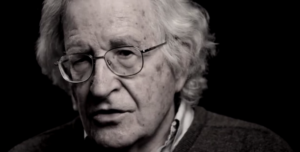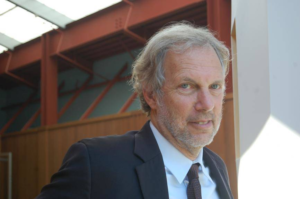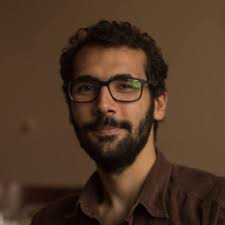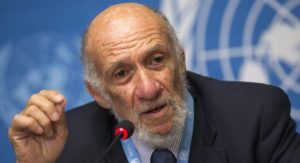Chomsky And Pollin: Just Transition Can Stop Earth From Becoming Uninhabitable
We must act now to heed the UN secretary-general’s warning that climate change is “making our planet uninhabitable.”
Climate change is “making our planet uninhabitable,” said UN Secretary-General António Guterres in late March. Indeed, the threats of the impending climate crisis have become very tangible, and the world’s top scientists are warning that the Earth is likely to pass a dangerous temperature threshold very soon unless we act now. Nonetheless, the gap between what is happening to the planet and what is needed in terms of climate action is growing rather than decreasing because, as Noam Chomsky points out in the joint interview with Robert Pollin that follows, “this is how the system works,” unless collective action forces those in power to change course. Moreover, it is becoming increasingly evident that a just transition is pivotal to transformative climate action for workers, communities, and all regions of the world. Pollin shows what a just transition entails and why it is so important.
Noam Chomsky is institute professor emeritus in the Department of Linguistics and Philosophy at MIT and laureate professor of linguistics and Agnese Nelms Haury Chair in the Program in Environment and Social Justice at the University of Arizona. One of the world’s most cited scholars and a public intellectual regarded by millions of people as a national and international treasure, Chomsky has published more than 150 books in linguistics, political and social thought, political economy, media studies, U.S. foreign policy, and world affairs. His latest books are Illegitimate Authority: Facing the Challenges of Our Time (with C. J. Polychroniou; Haymarket Books, 2023); The Secrets of Words (with Andrew Moro; MIT Press, 2022); The Withdrawal: Iraq, Libya, Afghanistan, and the Fragility of U.S. Power(with Vijay Prashad; The New Press, 2022); and The Precipice: Neoliberalism, the Pandemic, and the Urgent Need for Social Change (with C. J. Polychroniou; Haymarket Books, 2021).
Robert Pollin is distinguished professor of economics and co-director of the Political Economy Research Institute at the University of Massachusetts Amherst. One of the world’s leading progressive economists, Pollin has published scores of books and academic articles on jobs and macroeconomics, labor markets, wages and poverty, and environmental and energy economics. He was selected by Foreign Policy Magazine as one of the 100 “Leading Global Thinkers for 2013.” Chomsky and Pollin are coauthors of Climate Crisis and the Global Green New Deal: The Political Economy of Saving the Planet (with C. J. Polychroniou: Verso 2020) and are now working together on a new book on the climate emergency.
C. J. Polychroniou: Noam, it has been clear for decades that human activities are having a huge impact on the physical environment in many critical ways, and that we are the cause of global warming, with the burning of fossil fuels accounting for nearly 90 percent of all carbon dioxide (CO2) emissions. It is true, of course, that some concrete actions have been taken over the past three decades or so to stop environmental degradation and reduce carbon emissions, but the gap between what is happening to the planet, which includes a sharp decline in biodiversity, and what is needed in terms of environmental and climate action seems to be growing rather than decreasing. Indeed, one could even argue that our handling of the climate crisis is flawed as evidenced by the growing emphasis on carbon capture technologies rather than doing away with fossil fuels. Another revealing example of governments constantly advancing highly incomplete courses of action with regard to climate change is the adoption of a historic new law from governments across the European Union today toward deforestation. European governments have agreed to ban the import of goods linked to deforestation, but the new deforestation law does not oblige European banks or investors to stop funding deforestation. So, if it is the link between policy making and economic interests that prevents us from implementing fully comprehensive strategies to stop environmental destruction and prevent global warming from becoming worse, what ways are there out of this conundrum?
Noam Chomsky: Two years ago, John Kerry, Biden’s special envoy on climate, reported that he’d been “told by scientists that 50% of the reductions we have to make (to get to near zero emissions) by 2050 or 2045 are going to come from technologies we don’t yet have.”
While intended to strike a note of optimism, this forecast was perhaps a little less than reassuring.
A few months later, as U.S. representative at the COP27 Glasgow international conference on climate, Kerry was still more optimistic. He reported exuberantly that now the market is on our side, as asset managers pledge tens of trillions of dollars to overcoming the impending catastrophe.
A qualification was noted by political economist Adam Tooze: The pledge holds as long as the investments are profitable and “de-risked” by guarantees from the World Bank and International Monetary Fund.
The “technologies we don’t yet have” remain technologies we don’t yet have or can realistically envision. Some progress has been reported, but it is very far from what would be required to deal with the impending crisis.
The present danger is that what must be done to eliminate fossil fuel use is being set aside on the pretext that some remote technological breakthrough will ride to the rescue. Meanwhile we can continue to burn up the Earth and pour even more cash into the bulging profits of the fossil fuel industry, now so overflowing that they don’t know what to do with their incredible riches.
The industry of course welcomes the pretext. It might even spare some cash for carbon capture — maybe as much as a rounding error for their accountants — as long as the usual qualification holds: funded by the friendly taxpayer and de-risked. Meanwhile more federal lands are opened up for fossil fuel production, more gifts are provided to them like the 300-mile long Mountain Valley Pipeline – Manchin’s condition for not tanking the global economy — and other such amenities.
In the background of the euphoria about asset managers and technological miracles lies the Stimson Doctrine, enunciated by Secretary of War Henry Stimson 80 years ago as he was overseeing the huge mobilization for war: “If you are going to try to go to war, or to prepare for war, in a capitalist country, you have got to let business make money out of the process or business won’t work.”
That’s how the system works — as long as we let it.
In the early stages of the war, business was reluctant to accept the bargain. Most hated the reformist New Deal and did not want to cooperate with a government not entirely devoted to their interests. But when the spigot was opened, such reservations disappeared. The government poured huge resources into war production. Keeping to the Stimson Doctrine, policies were structured to ensure great profits for business contractors. That laid the basis for what was much later criticized as the military-industrial complex but might more accurately be described as the not-so-hidden system of U.S. industrial policy, the device by which the public funds the emerging high-tech economy: A highly inefficient system, as elaborated by Seymour Melman and others, but an easy way to gain congressional approval for what approved rhetoric calls a marvelous system of free enterprise that helps the munificent “job creators” labor day and night for the benefit of all.
Eisenhower apparently at first wanted to use the term “military-industrial-congressional complex.” That would have been appropriate. Why does Congress go along? One major reason is provided by political economist Thomas Ferguson’s well-confirmed “investment theory of politics.” In a current updating, once again corroborating the theory, he summarizes the crucial conclusion simply:
‘The dominating fact about American politics is its money-driven character. In our world, both major political parties are first of all bank accounts, which have to be filled for anything to happen. Voters can drive politics, but not easily. Unless they are prepared to invest very substantial time and effort into making the system work or organizations that they control will – such as unions or genuine grassroots political organizations – only political appeals that can be financed go live in the system, unless (of course) as helpful diversions.’
That insight into “our world” also offers advice as to ways out of the conundrum. And also, ways to confront the reigning Stimson Doctrine, which is a virtual epitaph for the human species in the context of the awesome and imminent threat of heating the earth beyond the level of recovery.
It is suicidal to look away from the gap between what is happening to the planet, which includes a sharp decline in biodiversity, and what is needed in terms of environmental and climate action seems to be growing rather than decreasing. When we do look, we find a mixed picture.
One critical case is the Amazon Forest. Its central role in global ecology is well understood. It is self-sustaining, but if damaged can shift rapidly to irreversible decline, with catastrophic effects for the region, and the entire world.
During Bolsonaro’s term in Brazil, agribusiness, mining and logging enterprises were unleashed in an assault on the forest and the Indigenous societies that have long lived there in harmony with nature. To take just one measure, “Deforestation across Brazil soared between 2019 and 2022 under the then president, Jair Bolsonaro, with cattle ranching being the number one cause.” More than 800 million trees were destroyed for beef export. The main researchers, the Indigenous peoples expert Bruno Pereira and his journalist collaborator Dom Phillips, were murdered while conducting their work in the Amazon.
Brazilian scientists report that some sectors of the forest have already passed the tipping point, transitioning to savannah, permanent destruction.
Lula’s election in 2022 offered hope to limit, perhaps end, the destruction. As minister of the environment, he appointed Marina Silva, a courageous and dedicated environmentalist, with a truly impressive record. But “the masters of mankind” who own the economy (in Adam Smith’s phrase) never rest. Their congressional supporters are chipping away at Silva’s jurisdiction.
Those who hope to save the world are not resting either. Brazilian ecologists are seeking ways to support Indigenous communities that have been the guardians of the forest, and to extend their reach.
The struggle continues.
It continues on other fronts as well. Some good news from China is summarized in the Washington Post. Reviewing many studies, the Post reports that China is far in the lead globally in “churn[ing] out batteries, solar panels and other key ingredients of the energy transition” as China has “moved aggressively on renewables,” leaving the U.S. far behind — very far behind in per capita terms, the relevant figure. China is “likely on track to meet its goals of peaking its emissions before 2030 and achieving net-zero emissions by 2060. It installed a record amount of solar power capacity last year — and this year alone is set to install more than the entire existing solar capacity of the United States.”
I’ve been mispresenting the article, however. The Post does not come to praise China, but to condemn it. Its praise is for the U.S., which, from its lofty perch on transitioning to renewable energy is seeking ways “to pressure China to help avert climate catastrophe” — the headline of the article. The article warns ominously that China is responsible for more than double U.S. emissions; or to translate from Newspeak, China is far behind the U.S. in per capita emissions, again the relevant figure.
The article discusses the means under consideration to induce China to join us in our noble pursuit of saving the climate, omitting, however, the most important of these: “Commerce Secretary Gina Raimondo said Tuesday that the U.S. will rally allies in order to mount pressure on the world’s second-largest economy. ‘If we really want to slow down China’s rate of innovation, we need to work with Europe,’ Raimondo said.”
We have to make sure to contain China’s innovations in producing the advanced technology that might save the world. The prime method, openly announced and highly praised, is to deny China access to the computer chips that are necessary for advanced technology.
At the same time, Raimondo warned China that the U.S. “‘won’t tolerate’ China’s effective ban on purchases of [Idaho corporation] Micron Technology memory chips and is working closely with allies to address such ‘economic coercion’.”
More insight into the famed “rules-based international order” and its subtle design, as the world burns.
Polychroniou: India has overtaken China as the world’s most populous country, and its population is certain to continue to grow in the decades ahead. Do we have to reduce global population to save the planet?
Chomsky: The global population should be reduced, perhaps considerably. Fortunately, there is a method to achieve this result, one that is furthermore humane and should be undertaken irrespective of the goal of saving the planet: education of women. That’s been shown to lead to sharp population reduction in both rich countries and poor.
Education of women should be supplemented by other humane methods, such as those prescribed in the 1948 Universal Declaration of Human Rights: “Motherhood and childhood are entitled to special care and assistance. All children, whether born in or out of wedlock, shall enjoy the same social protection.”
The Universal Declaration of Human Rights was initiated by the U.S., but that was in a different era, when New Deal social democracy still had not been undermined by the bitter business assault that finally reached its goals with Reagan. By then, the socioeconomic provisions of the declaration, including the ones just quoted, were ridiculed as “a letter to Santa Claus” (Reagan’s UN Ambassador Jeane Kirkpatrick). Kirkpatrick was echoed by Paula Dobriansky, the official in charge of human rights and humanitarian affairs in the Reagan and Bush administrations. Dobriansky sought to dispel “the myth [that] ‘economic and social rights’ [of the declaration] constitute human rights.” These myths are “little more than an empty vessel into which vague hopes and inchoate expectations can be poured.” They are “preposterous” and even a “dangerous incitement,” in the words of Bush ambassador Morris Abram when he was casting the sole vote against the UN Right to Development, which closely paraphrased the socioeconomic provisions of the Universal Declaration of Human Rights.
By then dismissal of the letter to Santa Claus had become largely bipartisan, though the GOP has maintained the lead in savagery, as we can see right now in the farcical doings in Congress.
There is a lot more to say about this, but for another time.
Polychroniou: Bob, a “just transition” is seen as essential for advancing ambitious climate change policies. Why is a “just transition” so crucial for effective climate action, and how exactly does it affect average citizens?
Robert Pollin: The term “just transition” has been used in various ways. I will first use it to refer to measures to support workers and communities that are presently dependent on the fossil fuel industry for their incomes and well-being. I will then consider below a second use of the term, considering the ways in which high-income economies need to support the Green New Deal programs advanced by low-income economies.
With respect to the first issue of supporting workers and communities that are now dependent on the fossil fuel industry, the broader context is very important. As we have discussed many times before, investments in energy efficiency and renewable energy to build a global zero-emissions energy infrastructure will be a major engine of overall job creation. That is, overall, saving the planet is very good for jobs. This is, of course, the opposite of the fulminations we hear from likes of Donald Trump, but also much more widely across the political spectrum. The vaguely respectable version of this position is that phasing out fossil fuel consumption might well be beneficial on environmental grounds, but it still going to be a job killer. And everyone other than rich coastal elites care more about jobs than the environment.
Here is how this position can actually resonate. While the clean energy transition is indeed a major engine of job creation overall, it is still also true that phasing out the fossil fuel industry will inevitably mean losses for workers and communities that now depend on the fossil fuel industry. In the absence of generous just transition policies, these workers and communities will indeed be facing layoffs, falling incomes and declining public sector budgets to support schools, health clinics and public safety. Should we be surprised that, without hard commitments to generous just transition policies, a good share of these workers and communities will vehemently oppose the fossil fuel industry phase out?
A viable just transition program for these workers and communities needs to build from the framework first advanced by Tony Mazzocchi, the late great labor movement and environmental leader. Mazzocchi was the person who came up with the term “just transition” in the first place. In considering the phasing out of nuclear plants and related facilities, Mazzocchi wrote in 1993: “Paying people to make the transition from one kind of economy to another is not welfare. Those who work with toxic materials on a daily basis … in order to provide the world with the energy and the materials it needs deserve a helping hand to make a new start in life.”
Starting from this Mazzocchi perspective, we still need to establish what specifically would constitute a generous set of just transition policies. For the workers, I would argue that, as a first principle, the aim of such policies should be simply, to truly protect them against major losses in their living standards. To accomplish this, the critical components of a just transition policy should include three types of guarantees for the workers: 1) a guaranteed new job; 2) a guaranteed level of pay with their new job that is at least comparable to their previous fossil fuel industry job; and 3) a guarantee that their pensions will remain intact regardless of whether their employers’ business operations are phased out. Just transition policies should also support displaced workers in the areas of job search, retraining and relocation. These forms of support are important but should be understood as supplementary. This is because, in themselves, they are not capable of protecting workers against major losses in their living standards resulting from the fossil fuel industry phase out.
Among major high-income economies, just transition policies for workers have recently been enacted within the European Union, Germany and, to a lesser extent, the United Kingdom. Such initiatives are still mainly at the proposal stages in the U.S., Japan, Canada. But even in the cases of Germany, the U.K. and the European Union, these policies remain mostly limited to the areas of job search, retraining and relocation support. In other words, in none of these cases have policies been enacted that provide workers with the guarantees they need.
The most substantive commitments to just transition policies have been advanced by the European Union, within the framework of the European Green Deal. Thus, Frans Timmermans, executive vice president of the European Commission, has stated that that “We must show solidarity with the most affected regions in Europe, such as coal mining regions, and others, to make sure the Green Deal gets everyone’s full support and has a chance to become a reality.”
In that spirit, the European Commission established a Just Transition Fund in January 2020 to advance beyond broad principles into meaningful concrete policy commitments. Nevertheless, to date, the scope of these programs and the level of funding provided are not close to adequate to achieve the goals set out by Vice President Timmerman, of “making sure the Green Deal gets everyone’s full support.” In particular, the categories of support for displaced workers under the Just Transition Fund are limited to skill development, retraining and job search assistance. The fund does not include any provision for the most critical areas of support for workers who will be facing displacement — that is, the guarantees with respect to reemployment, wage levels and pensions.
To obtain a sense of what a much more robust just transition program would look like, I have developed, with coworkers, illustrative programs for eight different U.S. states, for the U.S. economy overall, and, most recently, for South Korea. For now, it might be useful to focus on the case of West Virginia, since it is one of the most fossil fuel dependent state economies in the U.S. As such, West Virginia provides a highly challenging environment in which to mount a generous just transition program.
It is critical that the just transition policies for West Virginia would be one component of an overall Green New Deal program for the state. Under the overall program, fossil fuel production will fall by 50 percent as of 2030 and clean energy investments will make up the difference in the state’s overall energy supply. We estimate that the clean energy investments in West Virginia will generate an average of about 25,000 jobs throughout the state through 2030.
What about the job losses from the state’s fossil fuel industry phase out? There are presently roughly 40,000 people employed in West Virginia’s fossil fuel industry and ancillary sectors, comprising about 5 percent of the overall West Virginia labor force. But it is critical to recognize that all 40,000 workers are not going to lose their jobs right away. Rather, about 20,000 jobs will be phased out by 2030 as fossil fuel production is cut by 50 percent. This averages to a bit more than 2,000 job losses per year. However, we also estimate that about 600 of the workers holding these jobs will voluntarily retire every year. This means that the number of workers who will face job displacement every year is in the range of 1,400, or 0.2 percent of the state’s labor force. This is while the state is also generating about 25,000 new jobs through its clean energy transformation.
In short, there will be an abundance of new job opportunities for the 1,400 workers facing displacement every year. We estimate that to guarantee these workers comparable pay levels and intact pensions, along with retraining, job search and relocation support, as needed, will cost about $42,000 per worker per year. This totals to an average of about $143 million per year. This is equal to about 0.2 percent of West Virginia’s overall level of economic activity (GDP). In short, generous just transition policies for all displaced fossil fuel workers will definitely not create major cost burdens, even in such a heavily fossil fuel dependent state as West Virginia.
For the other seven U.S. states that we have examined, the costs of comparable just transition programs range between 0.001 and 0.02 percent of the state’s GDP. For the U.S. economy overall, the just transition program’s costs would total to about 0.015 percent of GDP — i.e. one-tenth to one-twentieth of what the West Virginia program would cost relative to the overall economy’s size. In short, providing workers with robust just transition support amounts to barely a blip within the U.S. economy. It is almost certainly the case that similarly robust just transition programs in other high-income economies would generate comparable results.
Now let’s consider communities’ transitions. In fact, communities that are now dependent on the fossil fuel industry will face formidable challenges adjusting to the decline of the industry. At the same time, it is critical that, as I described for the case of West Virginia, the decline of the fossil fuel industry will be occurring in conjunction with the rapid expansion of the clean energy economy. This will provide a basic supportive foundation for advancing effective community transition policies.
One important example has been the integration of clean renewable energy sources— primarily wind and solar power — into Alaska’s long-standing and extensive energy microgrid infrastructure. A microgrid is a localized power grid. Since the 1960s, these grids have been heavily reliant on diesel generators. But since 2005, renewable energy has become an increasingly significant alternative to diesel fuel. As of 2015, the Alaska Center for Energy and Power described this development as follows:
‘Over the past decade, investment in renewable energy generation has increased dramatically to meet a desire for energy independence and reduce the cost of delivered power. Today, more than 70 of Alaska’s microgrids, which represent approximately 12 percent of renewably powered microgrids in the world, incorporate grid-scale renewable generation, including small hydro, wind, geothermal, solar and biomass.’
Another important development, primarily thus far in Australia, Germany and the U.S. is with creating pumped storage hydropower sites in now defunct coal mines. A Wall Street Journal article from late 2022 reports as follows:
‘Mining operations that contributed to greenhouse-gas emissions could soon help to cut them. Around the world, companies are seeking to repurpose old mines as renewable-energy generators using a century-old technology known as pumped-storage hydropower. The technology, already part of the energy mix in many countries, works like a giant battery, with water and gravity as the energy source. Water is pumped uphill to a reservoir when energy supply is plentiful. It is released and flows downhill through turbines generating hydroelectric power when electricity demand is high or there are shortages of other types of power. Finally, the water is captured to be pumped uphill again in a repeated cycle. Surface and underground mines hold potential as reservoirs for the water, and could be developed with a lower environmental impact and upfront costs than building such plants from scratch, experts say.’
More broadly, there is no shortage of opportunities for revitalizing fossil fuel dependent communities through developing innovative clean energy projects in these very communities. To its credit, the Biden administration’s Inflation Reduction Act — which is primarily about financing clean energy investment projects in the U.S. — is providing large-scale funding for such projects. Naturally, the congressional Republicans tried to kill such funding through the farcical and now mercifully concluded debt ceiling debate. Fortunately, they failed.
Polychroniou: If moving away from fossil fuels and toward clean energy is the only way forward for the survival of the planet, climate action must be ultimately coordinated on a global level. What does global just transition entail, and what sort of new relationships of power need to be created since the world remains divided by huge differences between rich countries and poor countries?
Pollin: Let’s first be clear that there is no such thing as a viable climate stabilization program that applies only to rich countries. All countries, at all levels of development, need to drive their emissions to zero by 2050. It is true that, at present, China, the U.S. and the European Union together account for 52 percent of all global CO2 emissions. But that also means that if, miraculously, emissions in China, the U.S. and the European Union were all to fall to zero tomorrow, we would still be only a bit more than halfway to driving global emissions to zero. Moreover, if large, fast-growing developing economies like India and Indonesia continue to power their growth through a fossil fuel-dominant energy infrastructure, we will not cut global emissions at all by 2050 relative to today, even if emissions in China, the U.S. and the European Union were to indeed fall to zero. The point is that every place does matter if we really are going to hit the target of zero emissions by no later than 2050.
Thus, recognizing that a Green New Deal program has to be global in scope, the worker-and-community just transitions that I have described above for high-income economies applies equally, if not more so, for low-income economies. For starters, the clean energy investment transition programs will be a major engine of job creation in low-income economies just as it is for high-income economies. For example, research that I have done with coworkers finds that creating a clean energy economy in places like India, Indonesia and South Africa will generate between two-to-three times more jobs for a given spending level than maintaining these economies’ existing fossil fuel-dominant energy infrastructure. At the same time, phasing out fossil fuels in these economies will still also entail losses for fossil fuel industry dependent workers and communities. These workers and communities will require just transition support comparable to what we have described above for the U.S. and other high-income economies.
We still need to ask the question: who pays for the Green New Deal in low-income countries? As a baseline matter of planetary survival, we can start by recognizing that somebody has to pay. How then should we establish fair and workable standards as to who should pay, how much they should pay and via what financing channels?
Two initial points are critical. First, starting with the early phases of industrial development under capitalism, what are now the globe’s high-income countries, including the U.S., western Europe, Japan, Canada and Australia, are primarily responsible for loading up the atmosphere with greenhouse gas emissions and causing climate change. They therefore should be primarily responsible for financing the global Green New Deal. And second, moving from this historical perspective to the present, high-income people in all countries and regions have massively larger carbon footprints today than everyone else. As documented in a 2020 Oxfam study, the average carbon footprint of people in the richest 1 percent of the global population, for example, is 35 times greater than the average emissions level for the overall global population.
Thus, by any minimal standard of fairness, high-income countries and high-income people, no matter where they live, need to cover most of the upfront costs of a global clean energy transformation. At the same time, let’s also remember that these upfront costs are investments. They will pay for themselves over time, and then some, by delivering high efficiency and abundant renewable energy at average prices that are already lower today than fossil fuels and nuclear, and falling.
But it is still necessary to mobilize investment funds into low-income economies right now at both a speed and scale that are unprecedented. We are already seeing that, despite various pronouncements and pledges, private capitalists are not about to accomplish this on their own. As Noam described above, private capitalists are rather waiting for their clean energy investment prospects in developing economies to become “de-risked” by public entities. That means, to summarize Noam, that the private investors get big subsidies from public entities to undertake investments, but then pocket all the profits when the investments pay off. The public entities handing out the subsidies can include their own rich country governments, the governments of the low-income countries where they might invest, or international public investment institutions like the World Bank or International Monetary Fund.
It is also the case that the rich country governments have not been fulfilling the pledges they made initially in 2009 to provide $100 billion in annual climate-related support for poor countries. Between 2015-2020, 35 high-income countries reported providing an overall average of $36 billion per year, only one-third of the $100 billion annual pledge. Moreover, even this low-end figure overstates the actual level of climate finance rich countries are providing, given that countries can claim virtually anything as constituting “climate finance.” Thus, according to a Reuters story from June 1, 2023:
‘Italy helped a retailer open chocolate and gelato stores across Asia. The United States offered a loan for a coastal hotel expansion in Haiti. Belgium backed the film La Tierra Roja, a love story set in the Argentine rainforest. And Japan is financing a new coal plant in Bangladesh and an airport expansion in Egypt….
Although a coal plant, a hotel, chocolate stores, a movie and an airport expansion don’t seem like efforts to combat global warming, nothing prevented the governments that funded them from reporting them as such to the United Nations and counting them toward their giving total.’
It’s obvious that a serious system of monitoring is one necessary step toward moving significant financial resources into legitimate climate projects in developing economies. But in addition, it will also be critical that public investment banks in low-income countries serve as primary conduits in moving specific investment projects forward in their economies. The public investment banks should be managing the financing of clean energy projects in both the public and private sectors, along with mixed public/private projects. We cannot know what the best mix should be between public and private ownership with any specific project in any given low-income country (or for that matter, any high-income country). There is no point in being dogmatic and pretending otherwise. But, in all situations, we need to operate under the recognition that it is not reasonable to allow private firms to profit at rates that they have gotten away with under 40 years of neoliberalism. If private firms are happy to accept large public subsidies to support their clean energy investments, they then also need to be willing to accept limits on their profitability. Such regulatory principles are, for example, routine in the private U.S. electric utility sector. Similar standards can be easily established in all regions of the globe.
Copyright © Truthout. May not be reprinted without permission.
C.J. Polychroniou is a political scientist/political economist, author, and journalist who has taught and worked in numerous universities and research centers in Europe and the United States. Currently, his main research interests are in U.S. politics and the political economy of the United States, European economic integration, globalization, climate change and environmental economics, and the deconstruction of neoliberalism’s politico-economic project. He is a regular contributor to Truthout as well as a member of Truthout’s Public Intellectual Project. He has published scores of books and over 1,000 articles which have appeared in a variety of journals, magazines, newspapers and popular news websites. Many of his publications have been translated into a multitude of different languages, including Arabic, Chinese, Croatian, Dutch, French, German, Greek, Italian, Japanese, Portuguese, Russian, Spanish and Turkish. His latest books are Optimism Over Despair: Noam Chomsky On Capitalism, Empire, and Social Change (2017); Climate Crisis and the Global Green New Deal: The Political Economy of Saving the Planet (with Noam Chomsky and Robert Pollin as primary authors, 2020); The Precipice: Neoliberalism, the Pandemic, and the Urgent Need for Radical Change (an anthology of interviews with Noam Chomsky, 2021); and Economics and the Left: Interviews with Progressive Economists (2021).






